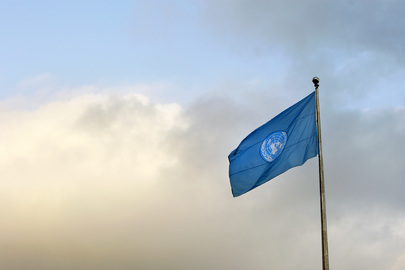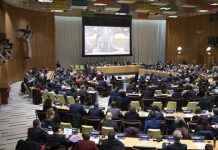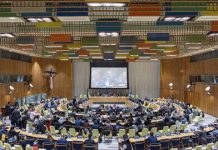Speaking to journalists at the UN Office at Geneva, Shoko Arakaki, director of humanitarian affairs at the UN reproductive health agency (UNFPA), said that essential services have been severely disrupted, while incidents of rape and conflict-related sexual violence have surged by a third compared to last year.
“Congolese women and girls endure tremendous suffering but never give up on their hope,” she said, adding that even before the most recent escalation of conflict, three women died every hour from pregnancy- and birth-related complications in the country.
During her visit to the capital, Kinshasa, and Goma, in the east, Ms. Arakaki saw firsthand the harsh realities facing women and girls. She met midwives continuing to deliver babies under extremely difficult conditions and listened to mothers who had lost everything.
Neglected humanitarian crises
“Women and girls are also being raped, exploited and abused in camps, in transit and within their own communities,” she said.
Often described as one of the world’s most neglected humanitarian crises, the DRC continues to face alarming levels of gender-based violence. According to recent reports, incidents of sexual exploitation, abuse and coercion are widespread – particularly in overcrowded displacement camps where protection and security measures remain limited.
The crisis is further exacerbated by chronic hunger and the lack of livelihood opportunities for displaced and host communities.
Across the DRC, the demand for emergency aid is rising sharply, with 27 million people projected to need humanitarian assistance in 2025. Without a solution to the ongoing conflict in the eastern provinces, the humanitarian and displacement situation is expected to deteriorate further.
Multiple rapes survivors
Ms. Arakaki recounted meeting a 14-year-old girl who had survived multiple rapes and was recovering from surgery at a UNFPA-supported hospital, still holding onto her dream of returning to school.
UNFPA currently provides women and girls in the DRC with essential health services, targeting 1.4 million people. The agency is urgently calling for increased funding to deliver life-saving reproductive care to those in critical need, including medical treatment and psychosocial support for survivors of gender-based violence.
The agency also urged all parties to the conflict to uphold their legal obligations to protect civilians and civilian infrastructure – including health facilities – and to ensure the safe and unimpeded delivery of humanitarian aid wherever it is needed.
Source of original article: United Nations (news.un.org). Photo credit: UN. The content of this article does not necessarily reflect the views or opinion of Global Diaspora News (www.globaldiasporanews.com).
To submit your press release: (https://www.globaldiasporanews.com/pr).
To advertise on Global Diaspora News: (www.globaldiasporanews.com/ads).
Sign up to Global Diaspora News newsletter (https://www.globaldiasporanews.com/newsletter/) to start receiving updates and opportunities directly in your email inbox for free.



























